What is Status.io?
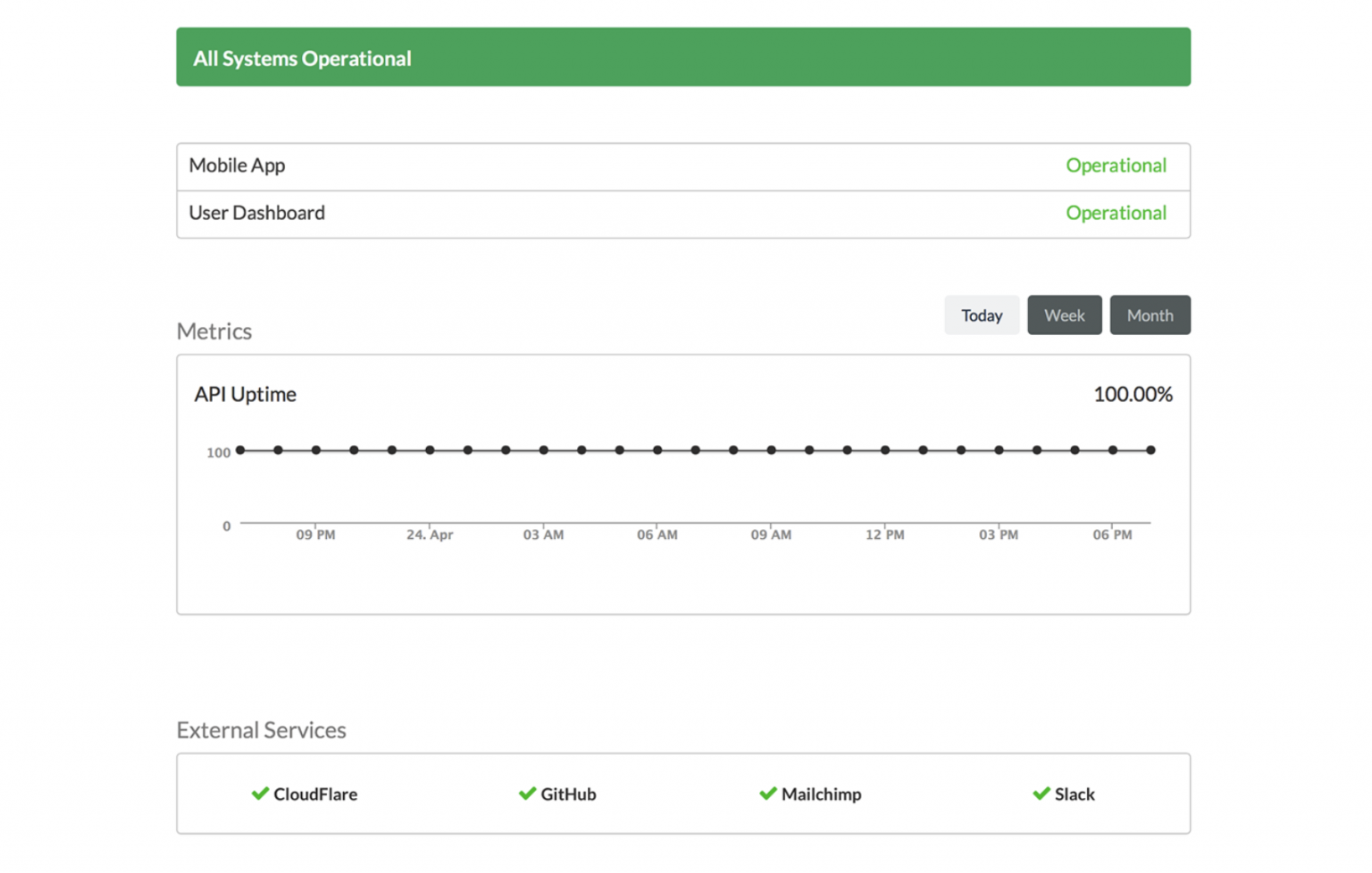
Status.io is a platform that provides hosted system status pages. The infrastructure of this provider is run by numerous systems distributed across different locations enhancing the availability of their product – status page.
The company stands out among other Status.io alternatives due to enabling users of complete control over their complex distributed systems and multi-tenant infrastructure.
Each status page has a unique API method so that developers can easily access the current status information. A status page for tests is another benefit of Status.io compared to its alternatives.
Status.io is a well-established platform, but for some users, its price is too high. It is common for businesses to use alternative solutions and this article contains a list of Status.io competitors looking at two key aspects: features and pricing.
Status.io Alternative #1 – StatusGator
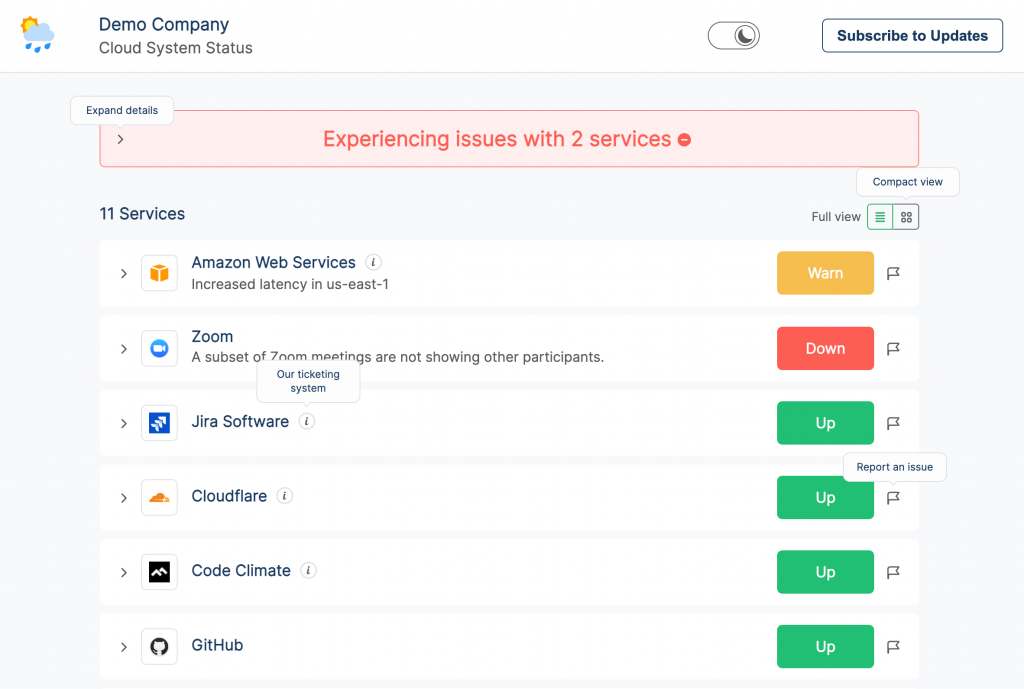
StatusGator is not an ordinary alternative to Status.io. In addition to providing a fully functional status page, StatusGator offers a unique service of status aggregation from over 2,800 cloud services.
It means that with StatusGator, you can communicate the status of not just your internal services but also the status of all your third-party dependencies, including hosting, payment gateways, critical APIs, and others.
By aggregating and normalizing all the status data together, you can effectively monitor your own service as well as the providers you rely on. This powerful combination makes StatusGator an excellent tool for DevOps and IT team status pages.
Status.io vs. StatusGator
StatusGator is a cheaper alternative to Status.io and offers a unique status aggregation feature for your status page. StatusGator displays the statuses of any cloud service or website into a single status page. This feature is not available on Status.io.
Additionally, StatusGator provides a direct monitoring feature that enables you to monitor your internal tools, website, and other services that do not have their own status pages.
Benefits of StatusGator
- Status page with an option to choose from 3,000 cloud services to display along with the status of your own service.
- Public and private status pages are available on cheaper plans than Status.io.
- There is no limit to the number of subscribers to your status page.
- Built-in website monitoring eliminates the need for third-party tools.
- Users can have their own domain, and upload a logo and a favicon to customize their status page.
- Branding can be removed and white-label status pages are also available.
- Password protection, 2FA, and SSO are all supported.
- Pricing is competitive and reasonable.
- A free plan is available for a public status page.
- All plans include a free trial period.
Statuspage.io as a Status.io Alternative
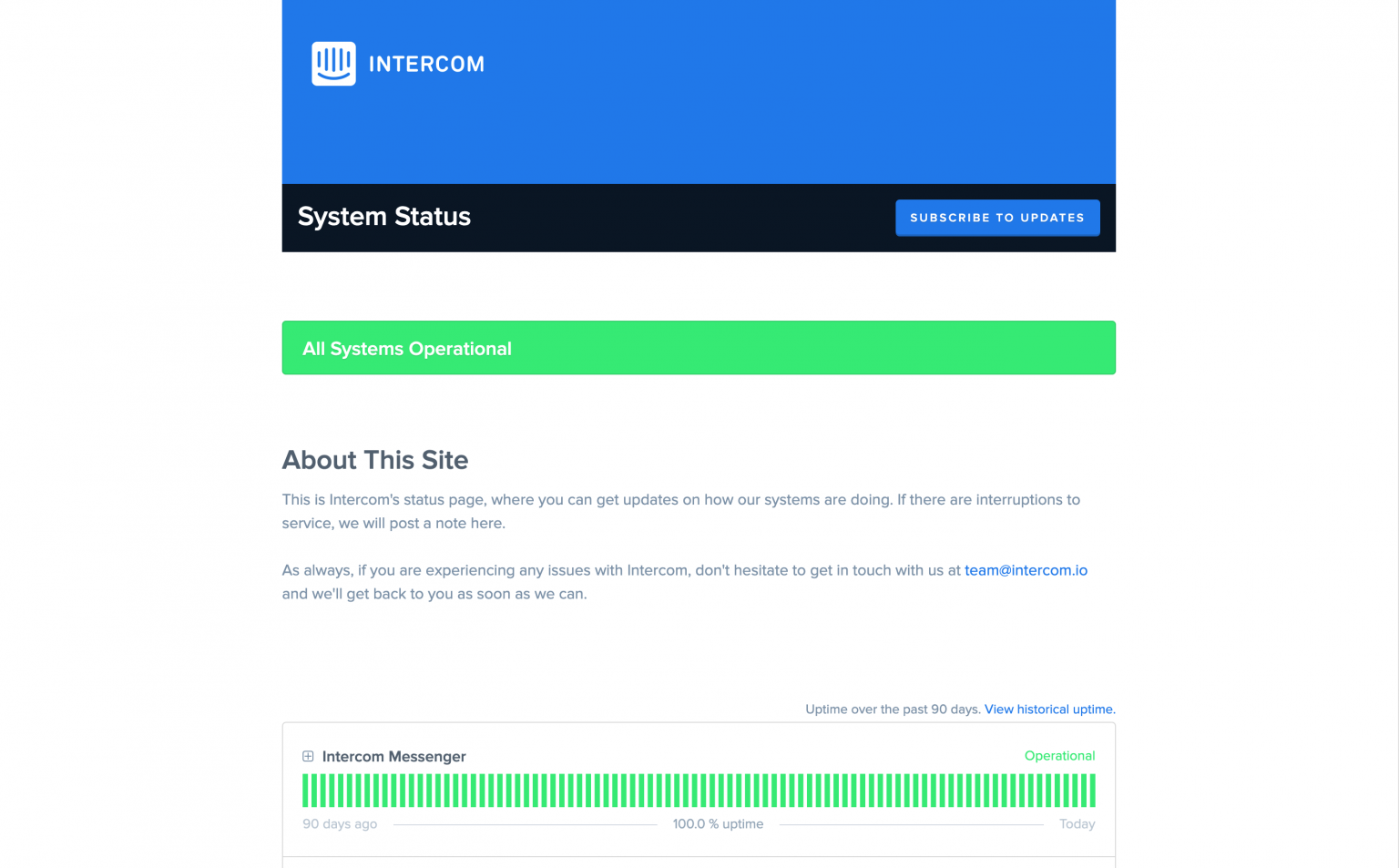
Status Page is a highly-regarded provider of status pages used to communicate the status of products, services, apps, etc. In 2016, Atlassian acquired Statuspage and made substantial investments to expand its status page features, setting it apart from other alternatives.
Despite its established reputation, Statuspage tends to be more expensive than other alternatives to Status.io.
Statuspage.io vs. Status.io
Statuspage.io is a slightly more expensive Status.io alternative, particularly with respect to enterprise plans that have up to 5,000 subscribers.
The plans offered by Statuspage.io are split into separate billing for public, private, and specific-audience status pages, while Status.io includes all of these in the upper-tier plans.
Both Statuspage.io and Status.io mention that users can add third-party statuses to their status page. However, it is not clear how many third-party services are available to choose from and to add (compared to StatusGator, which currently offers 2,670 providers).
Benefits of Statuspage.io:
- Team alerts via SMS or email so that your team can look at resolving an issue as soon as possible.
- A multitude of plans and features, more suited to larger companies.
- Daily information on the status page
Instatus.com as a Status.io Alternative
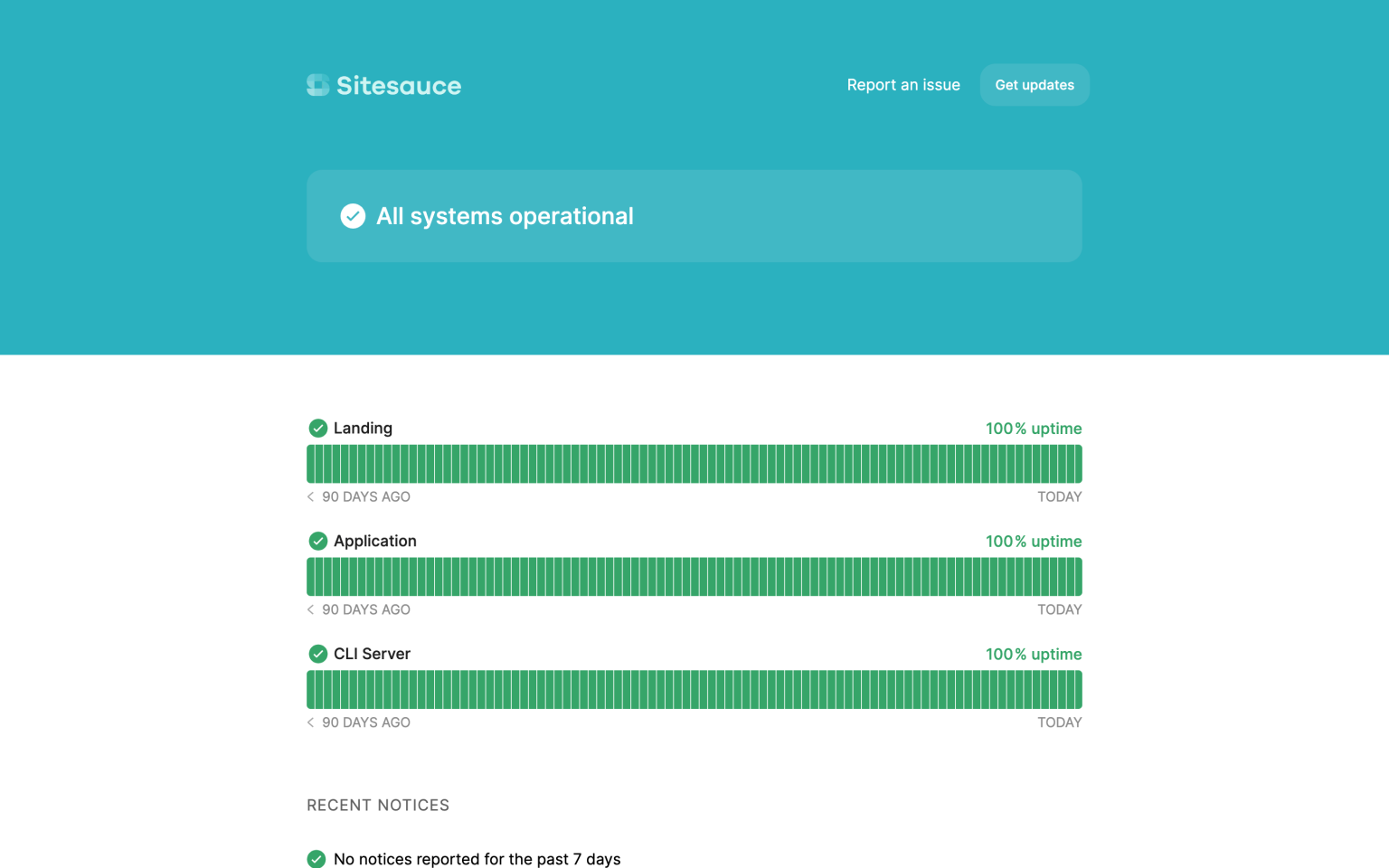
Instatus is a relatively new provider of status pages, but it is a robust alternative to Status.io. One of its main strengths is that it offers a free status page that supports an unlimited number of subscribers and teams.
Instatus includes all the features that you would expect, such as email subscriptions, scheduled maintenance, incident templates, API, and integration with incident management tools like PagerDuty.
Instatus vs. Status.io
The primary feature of the paid plan offered by Instatus is that users will have to pay $20 per month for the same product as the free plan but with the option to host it on a custom domain. In addition, a private status page will cost $50 per month.
To sum up, the primary distinction between Instatus and Status.io lies in their pricing. Instatus is a well-designed tool that is similar to Status.io and aims to differentiate itself primarily by offering reasonable pricing for smaller teams and businesses.
Benefits of Instatus
- Enables users to add status widgets to their websites.
- Offers unlimited subscriptions, and the price is not tied to the number of subscribers.
- Features a clean and simple design.
- Provides an API and integrates with incident management tools such as PagerDuty.
UptimeRobot as a Status.io Alternative
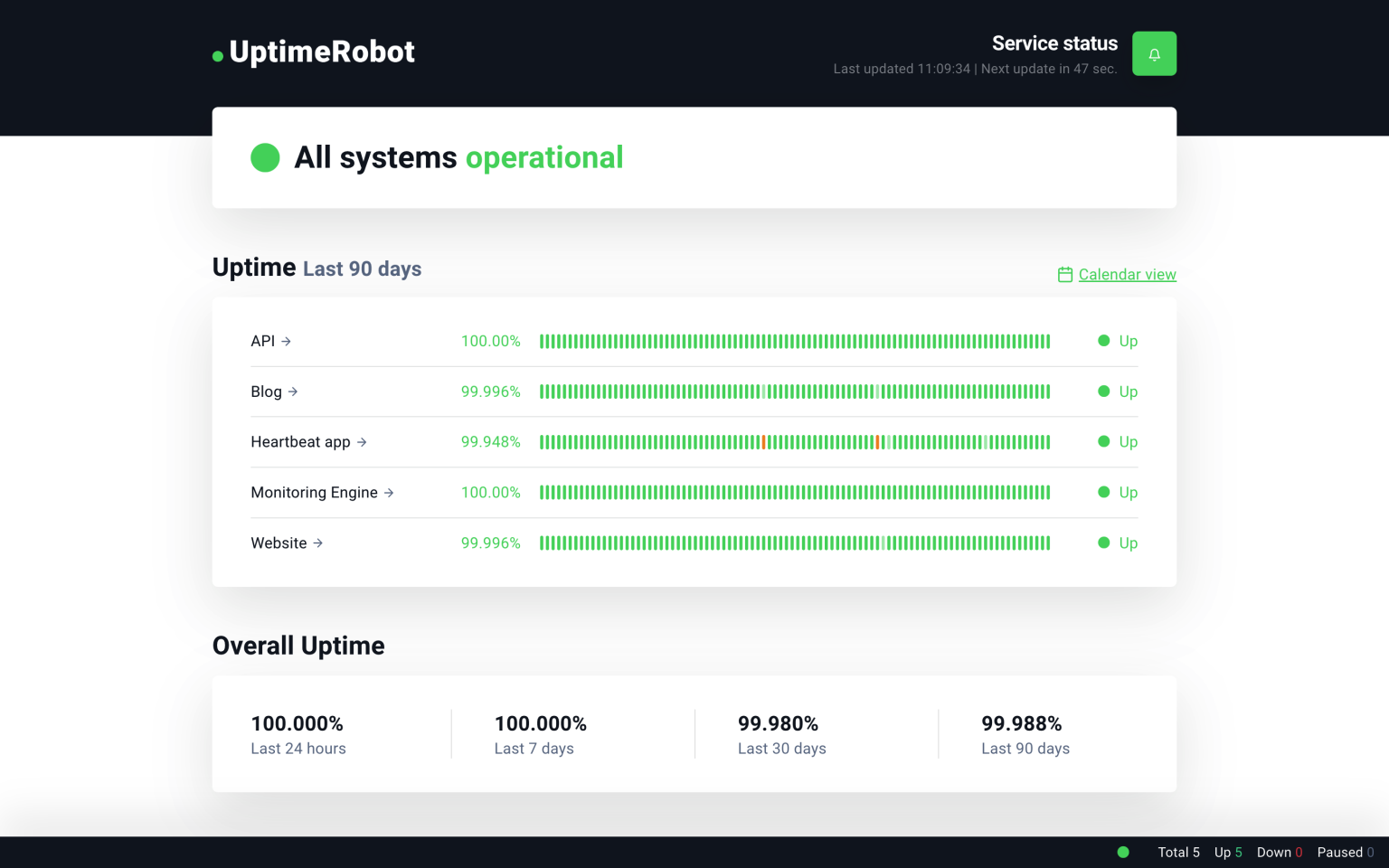
Another Instatus alternative is UptimeRobot. UptimeRobot is an uptime monitoring service that performs monitoring for the website, SSL, ping, ports, cron job, and keywords to differentiate among other Status.io alternatives.
The free plan provides users with a status page to showcase uptime (no other features available), but 50 monitors for the metrics mentioned above. To access unlimited white-label status pages, users can upgrade to the Team plan, which costs $29 per month when billed annually. However, some may consider this relatively costly compared to other alternatives to Status.io.
UptimeRobot vs. Status.io
UptimeRobot’s upper-tier paid plan includes unlimited white-label status pages, however, the free plan doesn’t offer many features. Keep in mind that UptimeRobot’s main focus is uptime monitoring, unlike Status.io.

Benefits of UptimeRobot
The two key benefits of UptimeRobot are:
- If users need a monitoring tool for a website, cron job, ping, and other metrics in addition to the status page, then UptimeRobot might be an alternative to Status.io.
- In case the plan does not meet the user’s needs, there is a 10-day window for a full refund.
Better Uptime as a Status.io Alternative
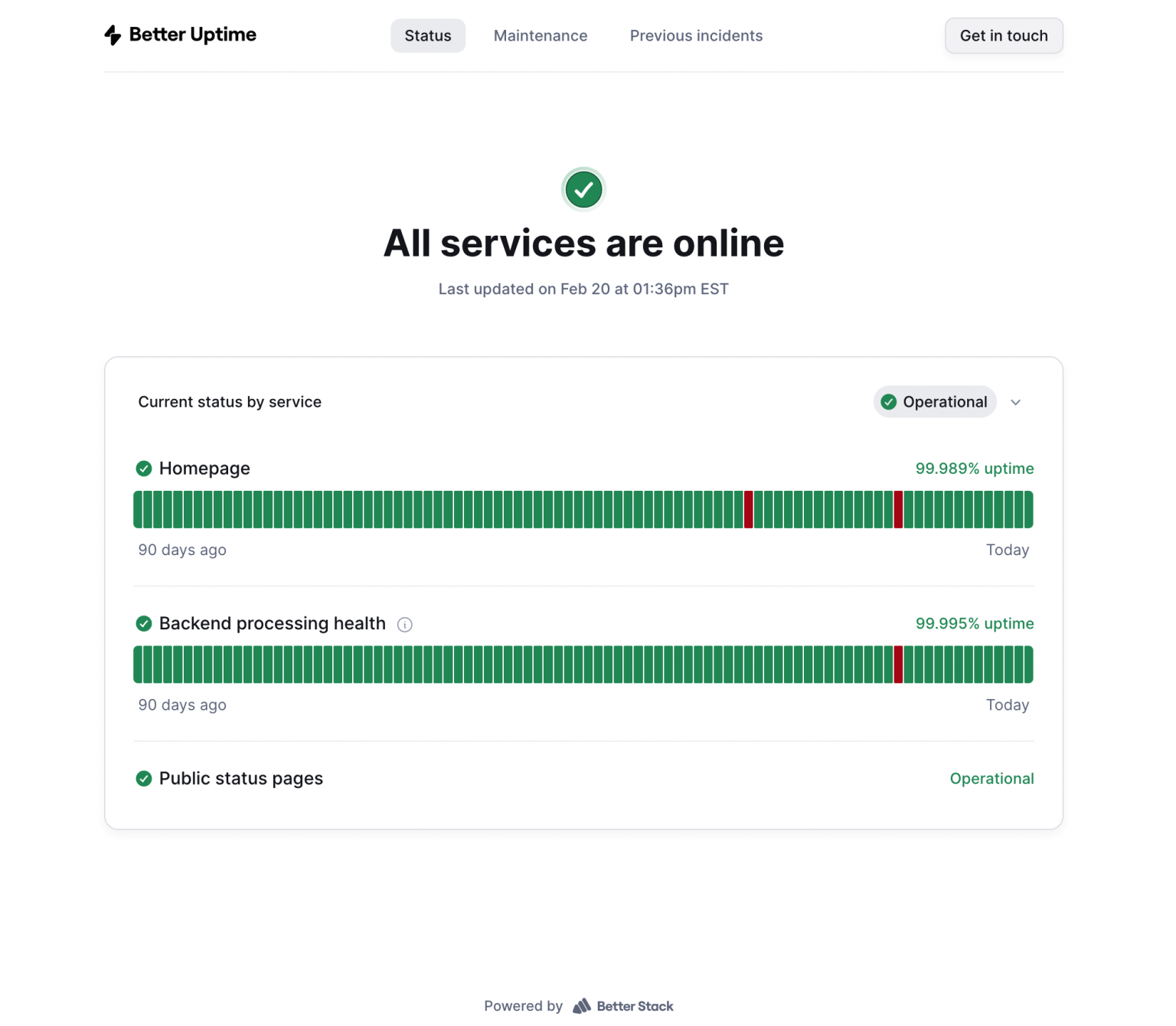
An alternative to Status.io, Better Uptime is an all-in-one product that merges incident management, uptime monitoring, and status pages with a sleek interface. Their on-call calendar scheduling feature for incident management is user-friendly and can be integrated with Google Calendar. It also offers advanced team management and access features similar to PagerDuty.
In terms of alerting, Better Uptime offers unlimited phone calls and SMS alerts for all paid plans and integration with Slack and Microsoft Teams. Also, Better Uptime offers embedding incident screenshots and debug information directly into the alerts.
Better Uptime vs. Status.io
Better Uptime provides a basic free status page that is connected to all existing monitors and can be edited in a matter of seconds. Users can fully customize status pages and publish them on a custom domain. With paid plans, users can set up password-protected pages and also offer email and API status subscriptions.
Benefits of Better Uptime
- All users can have a free status page that is hosted on a custom domain.
- Built-in uptime monitoring functionality is included.
- System status notices can be embedded.
- StatusGator integration allows users to see the status of all their vendors.
- A website widget is available.
Better Uptime integrates with StatusGator and can add up to the services of hosted status page, monitoring, and aggregation that StatusGator provides.
Upptime as a Status.io Alternative
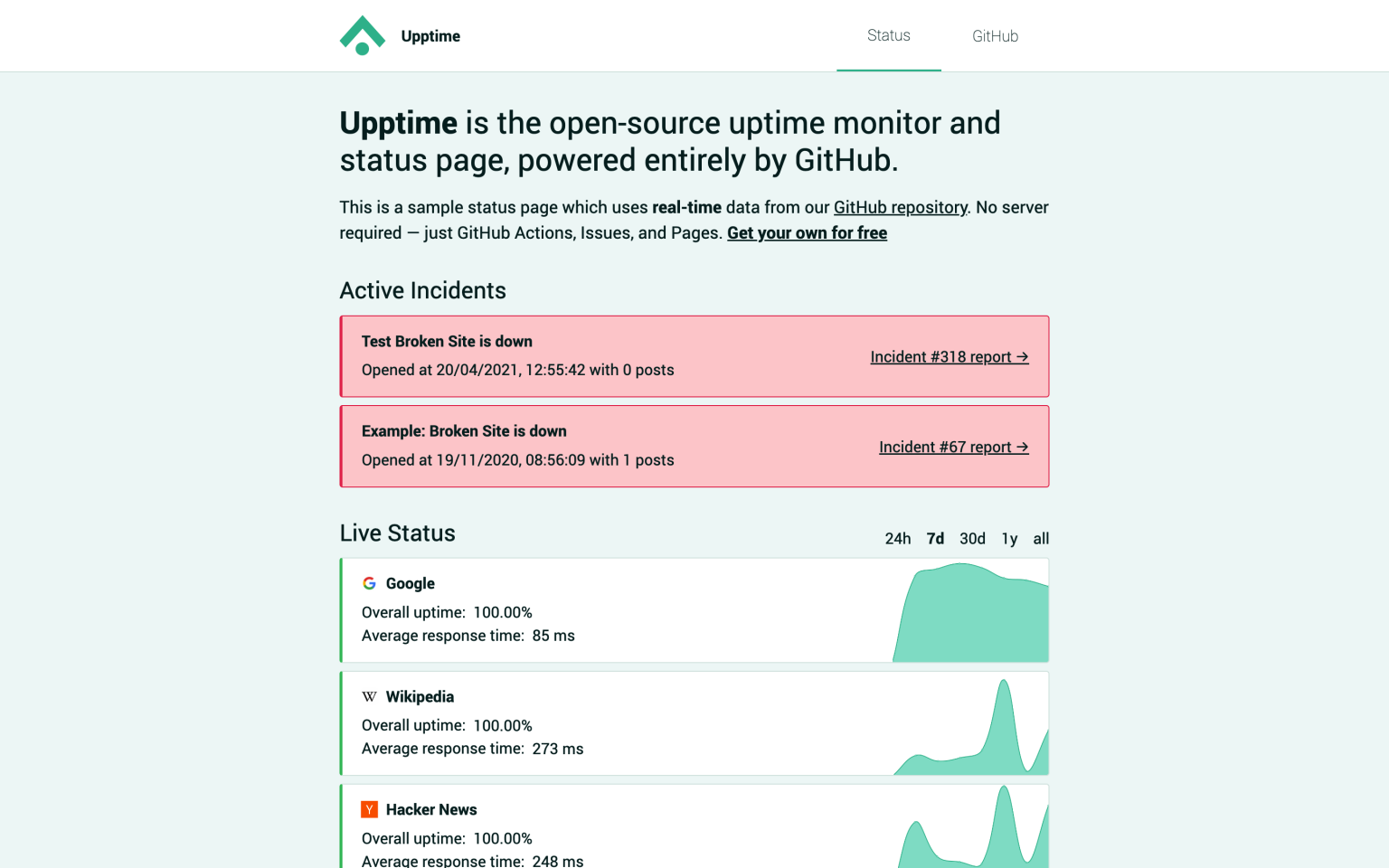
Upptime is a great alternative to Status.io.
Upptime provides a status page and open-source uptime monitor that is powered by GitHub. It utilizes GitHub Actions, Issues, and Pages.
GitHub Actions powers Upptime users to schedule workflows that run automatically at preset intervals. The most frequent interval is 5 minutes. It means that Upptime checks your website status every 5 minutes and updates the status page accordingly.
Another interesting feature is that Upptime generates graphs of the website’s response times daily. It allows users to view and share your long-term statistics. Additionally, Upptime’s website provides users with customization options for their status page, including the ability to change logos, text, graphs, and more.
Upptime vs. Status.io
Upptime is a free and open-source alternative to Status.io. However, it does not offer subscriptions to the status page. Despite that, it has excellent documentation and is highly customizable. Before deciding to use Upptime, it is advisable to review the report on GitHub’s reliability, as Upptime users rely on it.
Benefits of Upptime
- Free status page for all users on a custom domain
- Uptime monitoring built-in
- Embeddable system status notice
Cachet as a Status.io Alternative
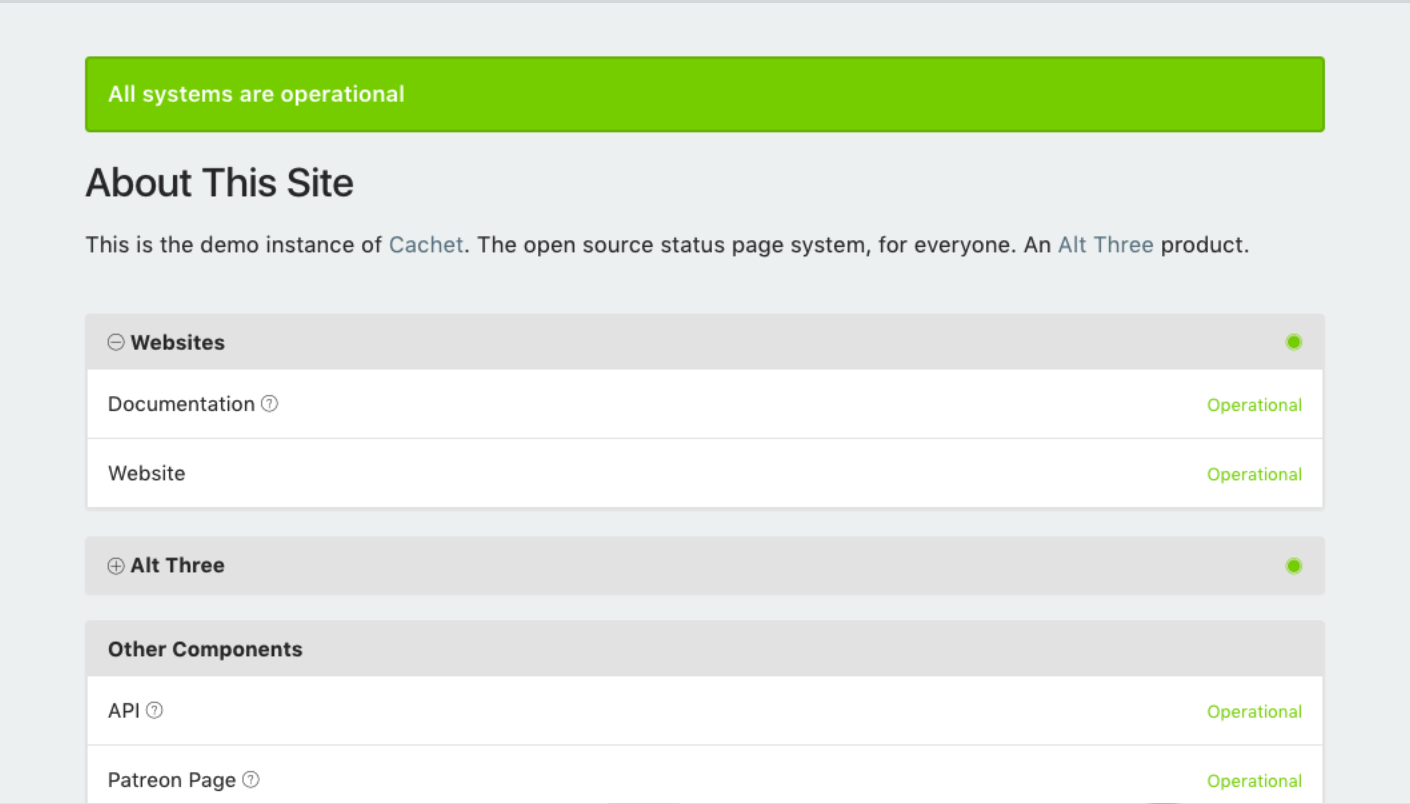
Cachet is a competitive Status.io alternative that uses Bootstrap 3 for a responsive design. It’s an open-source status page system that offers basic uptime monitors displayed on a dashboard. With its API, users can easily set up any metrics they want on the Cachet dashboard, such as uptime, error rates, or response times.
For added security, Cachet offers two-factor authentication using the Google Authenticator app. However, it’s important to note that users have to prepare their system before using Cachet.
Cachet vs. Status.io
In general, Cachet is a free and highly customizable open-source service. Its dashboard and UI are good, providing an impressive alternative to Status.io. Additionally, Cachet’s Slack community offers excellent support and ideas for setting up. It is evident that Cachet is a robust competitor if you are searching for an open-source option.
Benefits of Cachet
- Cachet is a free Status.io alternative.
- Cachet can be customized with built-in tools.
- Enables user to display any metric on the dashboard.
- 2FA (Two-factor authentication) is compatible with the Google Authenticator App.
- Supports multiple languages.
- Slack community and installation support.
- Outstanding with its excellent chart dashboard.
Side-by-Side Comparison of Status.io Alternatives
| Criteria | StatusGator | Statuspage | Better Uptime | Cachet | Instatus | Status.io | UptimeRobot | Upptime |
|---|---|---|---|---|---|---|---|---|
| Primary category | communication, monitoring, aggregation | communication | monitoring | communication | communication | communication | monitoring | monitoring |
| Key differences | ||||||||
| Private status page | ✅ On all plans | From $79/month | From $200/month | ❓ | For $50/month | For $349/month | For $348/month | ❓ |
| Components display | ✅ | ✅ | ❓ | ✅ | ✅ | ✅ | ❓ | ❓ |
| Website monitoring | ✅ | ❌ | ✅ | ❌ | ❌ | ❌ | ✅ | ❌ |
| Monitoring - third-party service statuses | 2,800+ | 200 | ❌ | ❌ | 168 | 170 | ❌ | ❌ |
| Trial | ✅ | ❌ | ❌ | ❌ | Only on private pages | ❌ | ❌ | ❌ |
| Cost per month | Starts at $72 | Starts at $29 | Starts at $30 | Free | Starts at $20 | Starts at $79 | Starts at $7 | Free |
| Status page features | ||||||||
| Hosted | ✅ | ✅ | ✅ | self-hosted | ✅ | ✅ | ✅ | ✅ |
| Favicon | ✅ | ✅ | ❓ | ✅ | ✅ | ✅ | ❓ | ✅ |
| CSS | ✅ | On paid plans | ✅ | ✅ | ✅ | ✅ | ❓ | ✅ |
| Branding removal | ✅ | ❓ | ❓ | ❓ | ❓ | On Standard plan and higher | On PRO plan and higher | ❓ |
| Components display | ✅ | ✅ | ❓ | ✅ | ✅ | ✅ | ❓ | ❓ |
| Subscribers to status pages | Unlimited | Limited | Limited. Available on higher plans only | Unavailable | Unlimited | Limited. Quantity depends on the plan | Limited. Available on higher plans only | Unavailable |
| Notifications | Email, SMS, Slack, MS Teams, Discord | Slack email, Webhook | Voice call, SMS, Mobile pushSlack, Microsoft Teams | SMS, Discord Slack, Twitter, Micrisoft teams, email | Twitter, SMS, voice call, Email, Slack, Discord Telegram | Email, SMS, voice call, Slack, Zapier, Twitter | Slack, Telegram, Webhooks |
|
| Password protection | ✅ | On Starter plan and higher | On Business plan and higher | ✅ | On Private PRO plan and higher | Authentication via SSO, SAML Identity Providers, IP Access control | ❓ | ❓ |
| Monitoring | ||||||||
| Ping interval | 5 min | 30 sec | 3 min or 30 sec on Freelancer plan and higher | ❓ | ❓ | ❓ | 5 min or 1 min on PRO plan | 5 min |
| General | ||||||||
| Documentation | Great | Good | Good | Great | OK | OK | OK | Good |
| Support | Contact form, email, chat | Contact form | Email, chat, phone | Email, Help with installation $249 | Chat, email | Chat | GitHub | |
| Account security | 2FA, SSO | 2FA, G Suite and SAML single sign-on | 2FA, GDPR, SSO on Enterprise plan | 2FA | SSO / SAML on Business plan | 2FA with Yubikey,Custom TLS / SSL Certificate, IP filtering, | 2FA | ❓ |

FAQ on Status.io Alternatives
Q: What is the alternative to Status.io?
A: StatusGator is the alternative to Status.io. There are multiple alternatives documented in this article that include multiple features and are priced differently. Depending on your needs and use there are multiple alternatives to choose from.
Q: What is the best Status.io alternative?
A: StatusGator is a viable option for those seeking an alternative to Status.io. What sets it apart is that it offers more than just a status page. StatusGator consolidates all your cloud services’ status data into a unified page. Not only is it less expensive than Statuspage.io, but it also provides a single plan that covers all public and private status pages, eliminating the need for separate pricing plans. In addition, StatusGator offers an internal monitoring tool, ensuring that all aspects are covered.
Q: What are Status.io competitors?
A: StatusGator is the primary competitor to Status.io, providing more than just a public, private, or password-protected status page. StatusGator enables users to include the statuses of cloud services on their status page. Furthermore, StatusGator is more cost-effective than its competitor.
Recent posts



